What makes SVP Seattle unique is that we are powered by the time, talent, treasure, and ties of our Partners. But what does that mean? In the case of our new Advocacy Program, it means teams of dedicated volunteer Partners spent two years bringing the vision to life.
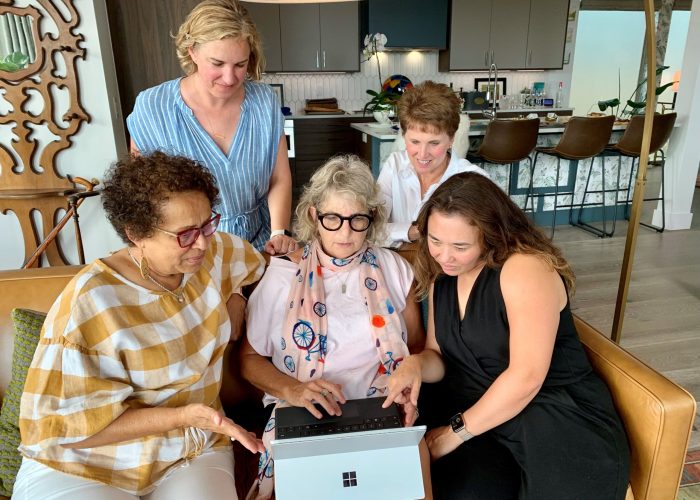
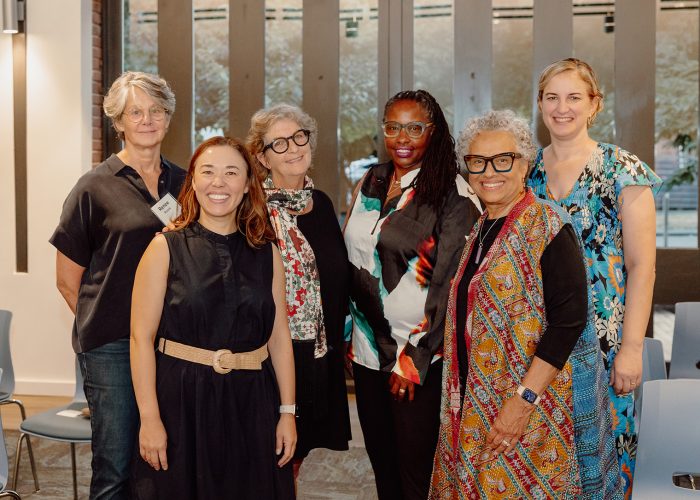
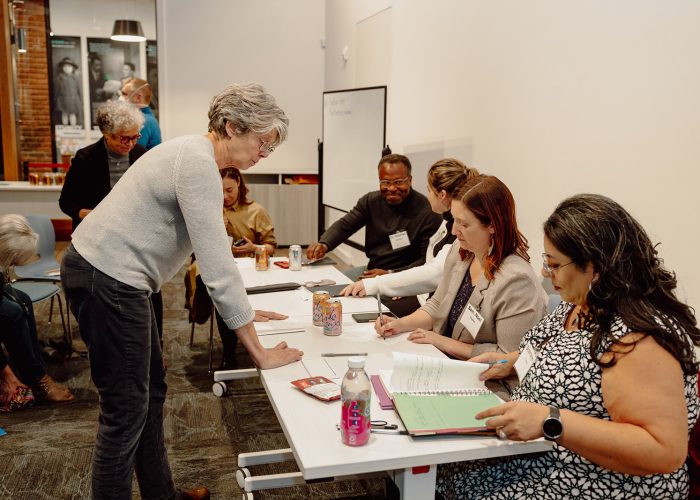
Moving a vision into reality
In the Spring of 2021, the SVP Seattle Board of Directors adopted our Reimagine Vision. This pivotal moment marked a significant shift in our organization’s approach, steering us towards using philanthropy as a tool to advance racial justice and equity, with a particular focus on advocacy.
However, as an organization historically focused on skilled volunteering and grantmaking, we needed to figure out how to turn this vision into a program, and even more importantly – a program with impact?
Co-Creating the Foundation
The Reimagine Vision emphasized the importance of co-creation – collaboratively designing our new initiatives with our Partners, the non-profit leaders we collaborate with, and those dedicated to SVP’s mission. To embody this approach, we launched the Advocacy Co-Creation Cohort in the summer of 2021. Comprising of Partners Braden Penhoet, John Clements, Regina Elmi, Sharonne Navas, Roxanne Hood-Lyons, Sri Remala, Tali Rausch, Janey Harvey, and Kathy O’Driscoll, the cohort explored vital questions about SVP’s role in advocacy.
Their collaborative efforts resulted in two key recommendations: implementing educational programming on advocacy and prioritizing the needs of our community partners.
Recommendations to Action
Then, in the fall of 2021, we had five Partners step up and join our first-ever Advocacy Task Force – Terri Cole, Tali Rausch, Melissa Johnsen, Kris Kaminishi, and Ruby Love. (We were later joined by Renee Russak and Sherry Richardson.) Over cups of coffee, slices of cheese, and too many cookies to count, the group started to move the Advocacy Co-Creation Cohort’s recommendations from paper to life.
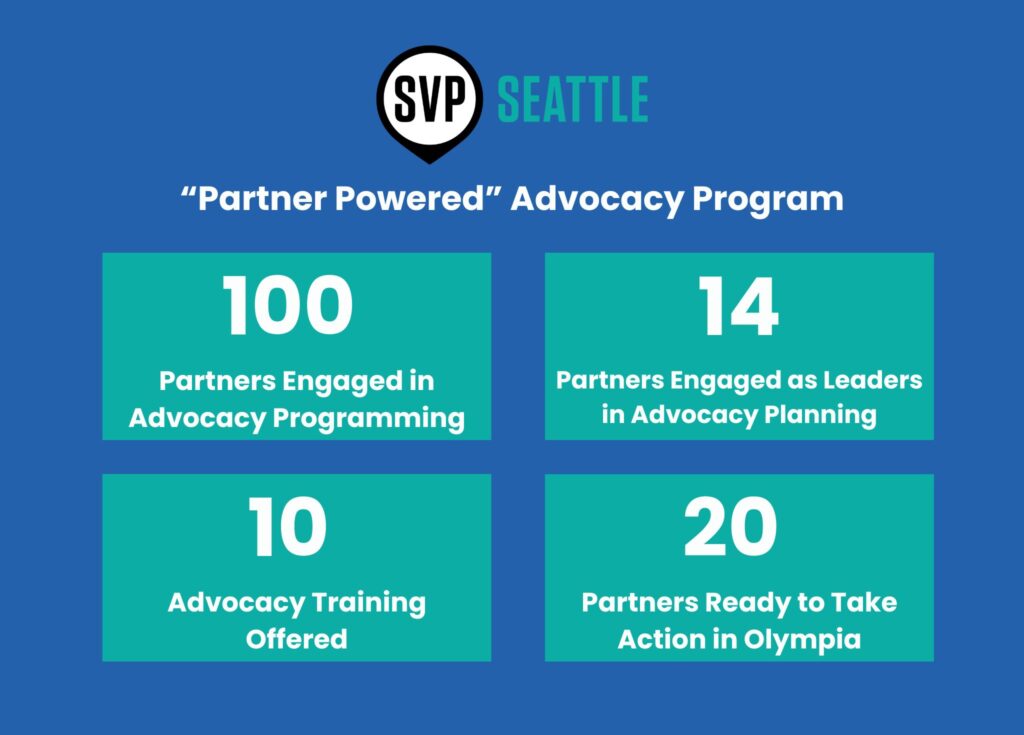
The group planned our three-part Advocacy 101 series to educate the Partnership on the basic of advocacy. Partner Sharon Chen shared her story of using her voice to advocate for important issues in the Washington State Legislature. Terri Cole taught our community how to find and track legislative bills. Executive Director Emiko Atherton shared her experience advocating in Washington, DC, and the importance of coalition building for big change. We held panels on education, domestic worker rights, and environmental justice policies.
We now had a core group of Partners eager and starting to get educated on advocacy. However, we still needed to find our path – should we advocate for multiple issues or focus on one? Where could we be most useful?
We then carried out the second recommendation from the Advocacy Co-Creation Cohort – listening to our community. The Task Force met with grantees, former grantees, and other community leaders to hear what they needed.
We heard that we needed to advocate within the funding community for more dollars to go to advocacy work. We heard that more funders needed to understand the importance of advocacy for long-term change. And we heard how powerful it was when our Partners used their voice in Olympia to serve as unlikely allies.
We also started to hear an issue theme emerge – wealth inequality.
Many of the organizations we listened to were focusing on policies to close the wealth gap. That’s because Washington State’s tax code is one of the most regressive in the nation. Without an income tax, the State must leverage inequitable sales and consumption revenues that disproportionately impact the lowest earners. For example, the lowest-earning residents in Washington State pay almost 18% of their annual incomes in state and local taxes, while the wealthiest pay only 3%. (Washington: Who Pays? 6th Edition – ITEP).
The Task Force identified the issue of wealth inequality and economic opportunity as core issue for SVP, specifically focusing on policies that create new ways of collective revenue. New sources of income for the state, invested in historically underfunded sectors, such as public education, public health and mental health services, and affordable housing, drive and sustain progress beyond what philanthropy alone can accomplish.
As a philanthropic community, SVP has a unique opportunity to advocate for policies that often impact high-net-worth philanthropists. While we are proudly a cross-class, cross-race organization, we are associated with those with financial wealth and our influence could make a difference in revenue reform. Advocating for policies to address wealth inequality was the place for SVP which lives at the intersection of community needs, an unfilled niche, and a place where we could have influence.
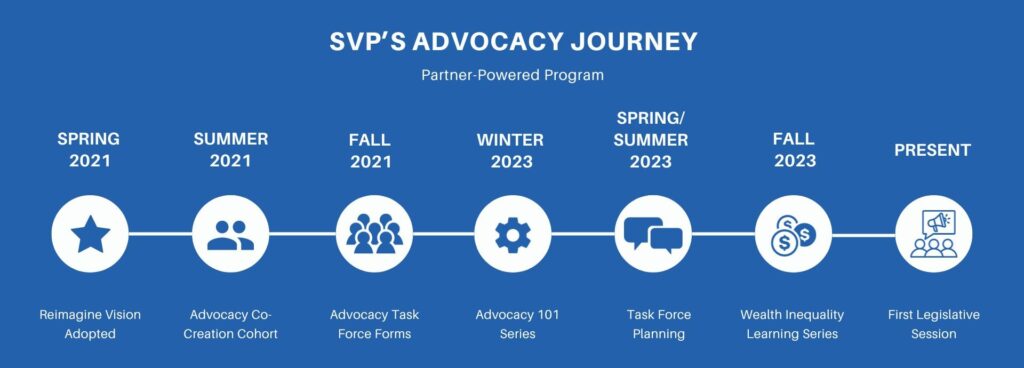
Project sheet to program launched
Early in 2023, the Task Force then set to work deciding how to roll out our focus on wealth inequality. In January of 2023, Terri Cole led the Task Force3 in a strategy and goal-setting session. We decided we wanted to create a space for SVP to learn more about wealth inequality, learn how others were addressing economic equality in their philanthropic giving, what policies were being considered in Washington, and how we could help advocate for those policies. Terri continued to project manage the Task Force throughout the year and they recruited speakers, crafted agendas, booked event venues, and sent out invitations.
Last Fall, the Advocacy Task Force launched our first learning series on Wealth Inequality. The series featured wealth inequality scholar Anne E. Price; Partners David and Cathy Habib; philanthropic Leaders Beth McCaw and Sri Remala; community leaders Dr. Stephan Blanford, Lillianne Ballesteros, and Sharonne Navas; and Senator Noel Frame. Over 50 people attended this series and got ready to advocate for change!
Partners in Policy
This winter, SVP is moving full steam ahead with our focus on wealth inequality and engaging in our first legislative session. The Task Force is tracking bills in the Washington State Legislature that are focused on economic equity and changes to how revenue is collected. Partners are contacting their legislators and letting them know they support these proposed policies.
And February 15, SVP is joining our former grantee Children’s Alliance for their Have a Heart for Kid’s Advocacy Day in Olympia. Children’s Alliance advocates for policies to support Washington’s most underserved children. One of their legislative priorities is economic justice the same bill’s SVP is tracking. We see this Advocacy Day as the perfect opportunity to support the needs of our non-profit partners and advocate for economic justice.
“Partner Powered” is more than just a phrase at Social Venture Partners Seattle; it’s the core of our work. We invite you to join us in creating this collective power by attending Have a Heart Day for Kid’s Day and joining our Advocacy Action list-serve.
